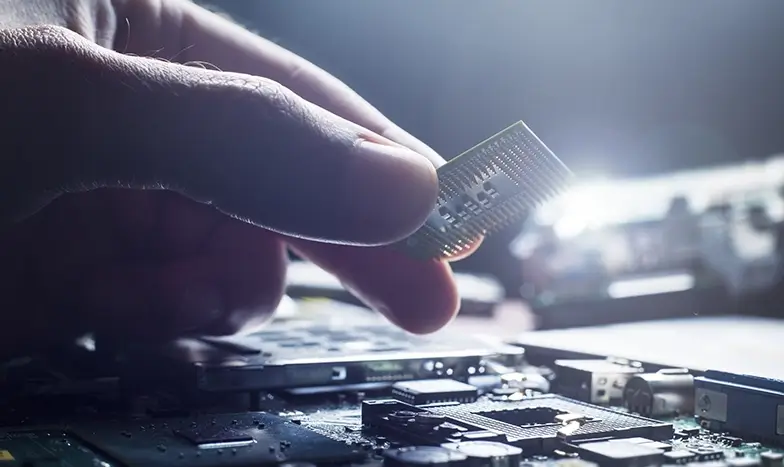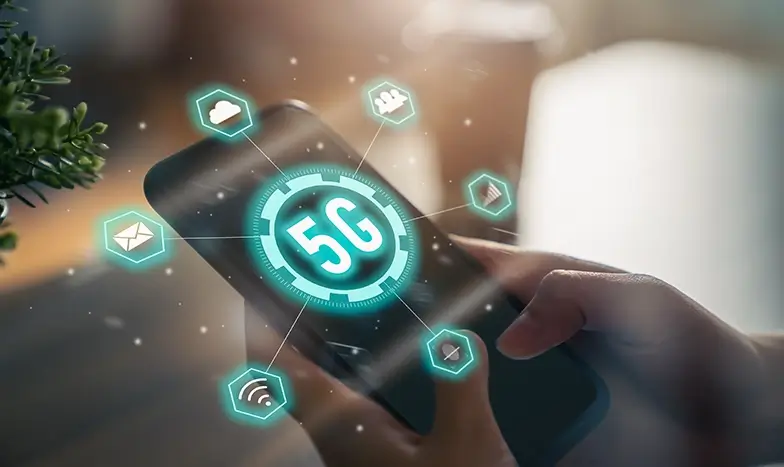- Home
- Academics
- School of Advanced Engineering
- B.Tech. (Engineering)
- Electronics and Computer Engineering
B.Tech. - Electronics & Computer Engineering
Program Details
The B.Tech. in Electronics & Computer Engineering program at UPES School of Advanced Engineering is meticulously crafted to address the dynamic demands of the ever-evolving technological landscape. This interdisciplinary program seamlessly integrates the realms of electronics, computer science, and communication, providing students with a comprehensive understanding of electronics hardware design, programming techniques, telecommunication engineering, and software development for IT applications. The curriculum is designed to offer a holistic education, ensuring that students acquire a well-rounded skill set that is highly relevant to the contemporary industry.
The core objective of the program is to nurture adept engineers who are well-equipped to confront real-world challenges in design, computation, communication, and control. By bridging the gap between computer and electronics domains, students not only gain a deeper understanding of each field but also develop the ability to seamlessly integrate their knowledge for practical applications. The program's distinctive approach emphasizes a balance between software-driven by hardware, empowering students to cultivate cutting-edge skills that align with the high-tech sector's demands.
Throughout the duration of the program, students are provided with abundant opportunities to enhance their proficiency in electronics hardware and IT development. This ensures that graduates emerge well-prepared for a diverse array of roles, whether it be in hardware design, software development, or the intersection of both fields. The B.Tech. in Electronics & Computer Engineering program at UPES promotes a multidisciplinary approach, instilling in students the versatility and adaptability required to excel in the fast-paced and dynamic realm of technology. This well-rounded education not only equips graduates with a competitive edge but also positions them as valuable contributors to the ever-expanding field of electronics and computer engineering.
Program Highlights
- The B.Tech. Electronics and Computer Engineering program seamlessly blends electronics, computer, and communication engineering, focusing on hardware design, programming techniques, telecommunication, and software development, preparing students for diverse real-world challenges.
- Offering a balanced curriculum, the course enhances students' skills in both computer and electronics domains, providing ample opportunities for hardware and IT development.
- Access to state-of-the-art labs, including DST FIST sponsored lab for battery testing, Texas Instruments embedded system lab, and Advanced Power System and Protection lab, creates an environment conducive to innovative research and teaching.
- The B.Tech. Electronics and Computer Engineering program encourages students to explore the intersection of electronics and computer engineering, the program facilitates engagement in cross-domain projects, developing a comprehensive skill set for tackling industry demands.
- With a 100% placement record, students receive multiple offers from core electronics and software industries, ensuring excellent career prospects and opportunities for professional growth.
- Taught by experienced faculty actively engaged in research, the program keeps students abreast of the latest trends and advancements in electronics and computer engineering, ensuring they are well-prepared for the evolving industry landscape.
Future Scope / Industry Trends
The future of B.Tech. in Electronics & Computer Engineering is bright, offering promising prospects in both electronics-based hardware and computer-based software industries. This program's versatility and adaptability make it an evergreen choice, with high demands in service-based sectors. Graduates enjoy the flexibility to choose between electronics and computer domains for further studies. The program's outcomes align seamlessly with the needs of various industries, including AI & ML applications, telecommunication, embedded systems, software development, network engineering, and the information technology-enabled service sector. Overall, B.Tech. Electronics and Computer Engineering provides a solid foundation for a dynamic and rewarding career in the rapidly evolving and technology-driven world, positioning graduates at the forefront of innovation and industry advancements.
Career Opportunities
Completing the B.Tech. in Electronics & Computer Engineering program at UPES School of Advanced Engineering unlocks diverse career pathways in cutting-edge industries. Graduates can delve into roles spanning semiconductor design, telecommunications, embedded systems, artificial intelligence, software development, IT engineering, computer programming, network engineering, design engineering, system engineering, ASIC engineering, information technology analysis, and robotics. Armed with a robust foundation in electronics and computer engineering, students can embark on careers as electronics engineers, software developers, system analysts, and network administrators. Additionally, abundant opportunities await in research and development, data science, and cybersecurity, positioning students as highly sought-after professionals in today's technology-centric job market.
Placements
The B.Tech. in Electronics & Computer Engineering program at UPES School of Advanced Engineering has consistently excelled in placements, maintaining a stellar 100% placement rate over the last three years. Students of this program have secured promising job opportunities in the industry, with the highest packages showcasing an impressive upward trajectory. In the academic year 2020-21, the highest package reached 10 LPA, followed by a remarkable increase to 21.17 LPA in 2021-22, and a commendable 13.65 LPA in 2022-23. The average package has also witnessed consistent growth, starting from 5 LPA in 2020-21, progressing to 6 LPA in 2021-22, and further reaching 6.30 LPA in 2022-23. Notably, approximately 30% of students received multiple job offers, underscoring the program's dedication to fostering strong placements and enhancing overall employability.
Fee Structure
Click here for detailed Fee Structure.
Curriculum
Curriculum 2025-2029
Semester 1
| Course | L | T | P | Credits |
|---|---|---|---|---|
| Managing Self | 2 | 0 | 0 | 2 |
| Environment and Climate Change | 2 | 0 | 0 | 2 |
| Engineering Mathematics I | 3 | 1 | 0 | 4 |
| Physics | 3 | 1 | 2 | 5 |
| Programming for Engineers | 1 | 0 | 4 | 3 |
| Basic Electrical and Electronics Engineering | 3 | 0 | 2 | 4 |
| TOTAL | 20 |
Semester 2
| Course | L | T | P | Credits |
|---|---|---|---|---|
| Time & Priority Management | 2 | 0 | 0 | 2 |
| Environment and Climate Change | 2 | 0 | 0 | 2 |
| Analog Electronics I | 3 | 0 | 0 | 3 |
| Engineering Mathematics II | 3 | 1 | 0 | 4 |
| Workshop Practice | 1 | 0 | 2 | 2 |
| Engineering Graphics | 1 | 0 | 2 | 2 |
| Digital Logic and Computer Design | 3 | 0 | 0 | 3 |
| Chemistry | 3 | 0 | 0 | 3 |
| Design and Build Lab | 0 | 0 | 2 | 1 |
| TOTAL | 22 |
Semester 3
| Course | L | T | P | Credits |
|---|---|---|---|---|
| Exploratory 1 | 3 | 0 | 0 | 3 |
| Communication Skills (Oral) | 2 | 0 | 0 | 2 |
| Data Structure | 3 | 0 | 2 | 4 |
| Signals and Systems | 3 | 0 | 0 | 3 |
| Analog Electronics-II | 3 | 0 | 2 | 4 |
| Digital System Design | 3 | 0 | 2 | 4 |
| Social Internship | 0 | |||
| TOTAL | 20 |
Semester 4
| Course | L | T | P | Credits |
|---|---|---|---|---|
| Communication Skills (Written) | 2 | 0 | 0 | 2 |
| Exploratory 2 | 3 | 0 | 0 | 3 |
| Database Management System | 3 | 0 | 2 | 4 |
| Communication System | 3 | 0 | 2 | 4 |
| Operating system | 3 | 0 | 2 | 4 |
| Probability & Statistics | 3 | 0 | 0 | 3 |
| Machine learning with Python | 0 | 0 | 4 | 2 |
| TOTAL | 22 |
Semester 5
| Course | L | T | P | Credits |
|---|---|---|---|---|
| Technologies of Future/Meta 101 | 2 | 0 | 0 | 2 |
| Working with People | 2 | 0 | 0 | 2 |
| Exploratory 3 | 3 | 0 | 0 | 3 |
| Design and Analysis of Algorithm | 3 | 0 | 2 | 4 |
| Microprocessors and Microcontrollers | 3 | 0 | 2 | 4 |
| VLSI Design | 3 | 0 | 2 | 4 |
| Capstone I | 2 | |||
| TOTAL | 21 |
Semester 6
| Course | L | T | P | Credits |
|---|---|---|---|---|
| Deepening Self | 2 | 0 | 0 | 2 |
| Exploratory 4 | 3 | 0 | 0 | 3 |
| Specialization Course I | 3 | 0 | 0 | 3 |
| Advanced Programming | 2 | 0 | 2 | 3 |
| Embedded Systems and IoT | 3 | 0 | 2 | 4 |
| Specialization Course II | 3 | 0 | 0 | 3 |
| Capstone II | 2 | |||
| Industrial visit | 0 | |||
| TOTAL | 20 |
Semester 7
| Course | L | T | P | Credits |
|---|---|---|---|---|
| Exploratory 5 | 3 | 0 | 0 | 3 |
| Agile Software Engineering | 3 | 0 | 2 | 4 |
| Data Communication and Networking | 3 | 0 | 2 | 4 |
| Specialization Course III | 3 | 0 | 0 | 3 |
| Specialization Course IV | 3 | 0 | 0 | 3 |
| Major Project I | 2 | |||
| Industrial Internship | 1 | |||
| TOTAL | 20 |
Semester 8
| Course | L | T | P | Credits |
|---|---|---|---|---|
| Exploratory 6 | 3 | 0 | 0 | 3 |
| Specialization Course V | 3 | 0 | 0 | 3 |
| Digital Signal Processing | 3 | 0 | 0 | 3 |
| Mobile and Web Application | 3 | 0 | 0 | 3 |
| Major Project II | 6 | |||
| E-Waste Management and Recycling | 2 | 0 | 0 | 2 |
| TOTAL | 20 |
Eligibility
Students who are interested must satisfy the designated minimum eligibility requirements for the B. Tech. Electronics & Computer Engineering program:
Minimum 50% marks in Classes X and XII with 50% in PCM (Physics/Chemistry and Mathematics) in Class XII.
Selection Criteria
The criteria for selecting students interested in pursuing B.Tech. in Electronics & Computer Engineering at UPES is determined by evaluating the individual's performance in UPESEAT/ JEE/ Board Merit/ SAT/ CUET.
Minors
To opt the minors, please choose the minors from the bucket. Click here to know more.



